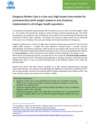Ethiopia: Somali refugees to be relocated away from border
This is a summary of what was said by UNHCR spokesperson Jennifer Pagonis – to whom quoted text may be attributed – at today's press briefing at the Palais des Nations in Geneva.
In Ethiopia today (Friday), UNHCR teams are expected to start relocating a group of 500 newly-recognized Somali refugees who fled from renewed conflict in strife-torn south and central Somalia over the last year. They have been staying around the Kebribeyah area, near the Somali border in eastern Ethiopia and are being relocated to a re-opened UNHCR camp at Teferi Ber.
The refugees are part of a group of 4,000 Somali refugees who have recently been granted refugee status by UNHCR and the government's Authority for Refugees and Returnees Affairs (ARRA). An estimated 7,000 additional Somalis who also claim to have fled fighting and insecurity in Somalia, are waiting to be screened at other sites in eastern Ethiopia.
The new camp site at Teferi Ber, some 120 km north of Kebribeyah, was formerly a UNHCR camp which in the 1990s hosted some 49,000 mainly Somalis refugees who had fled fighting in their country. The camp was officially closed in 2001 after all the refugees returned, mainly to the self -declared republic of Somaliland.
After arriving at Teferi Ber, the refugees will spend three days in a reception centre where they will be allocated plots of land to construct homes and given building materials. They will also be given food as well as tarpaulins, blankets, sleeping mats, kitchen sets, jerry cans, kerosene stoves, and soap. The ARRA has established a temporary health centre until permanent structures can be built.
The Somali Region of Ethiopia already hosts more than 16,500 refugees. With the new arrivals, the total is 20,300. At the peak of the Somali refugee crisis in the early 90s, the region hosted 628,000 refugees in eight camps. The overwhelming majority went home between 1997 and 2005, and all of the camps were closed except a camp at Kebribeyah.
Related news and stories
Thousands of newly arrived Somali refugees in Ethiopia relocated to new settlement
Samira's Story
Drought brings life-threatening food shortages for refugees in Ethiopia
100,000 new Somali refugees arrive in Ethiopia in the past month, UN and partners are calling for urgent funding
UNHCR teams and partners rush assistance to some 100,000 newly arrived Somali refugees in hard-to-reach area of Ethiopia
As the Horn of Africa drought enters a sixth failed rainy season, UNHCR calls for urgent assistance
-

Procurement Figures 2022
5 Feb 2021 -

OPINION: When will refugees get a COVID-19 vaccine?
5 Feb 2021 Jordan and Lebanon are including Syrian refugees in their vaccination campaigns. If we don't live up to our commitments to refugees we risk a lost generation. -

UNHCR and IOM call for improved safeguards for the displaced on the frontlines of climate emergency
4 Feb 2021 -

Sexual and Reproductive Health - High Impact Practice - Kangeroo Mother Care, 2021
4 Feb 2021 The reduction of maternal and newborn deaths is central to UNHCR sexual and reproductive health programmes. This document describes Kangaroo Mother Care, a low-cost, high-impact intervention for low-birth weight newborns to support their essential needs for warmth, exclusive breastfeeding and infection prevention. -

Biden move on refugee resettlement will save lives: UNHCR
4 Feb 2021 -

Yemen's 'marginalized ones' endure hunger, displacement
4 Feb 2021 Conflict and displacement have compounded centuries of discrimination against Yemen's Muhamasheen minority, denying access to jobs, documentation and humanitarian aid. -

Keeping displaced families safe amid surge in Niger violence
3 Feb 2021 As increasing numbers are forced from their homes by armed groups in Niger's volatile western border region, UNHCR mobilizes network of local protection monitors. -

Economic Community of West African States (ECOWAS)
2 Feb 2021 -

The European Union, UNICEF and UNHCR join efforts to protect children on the move in Central America, Mexico and Southern Africa
2 Feb 2021
